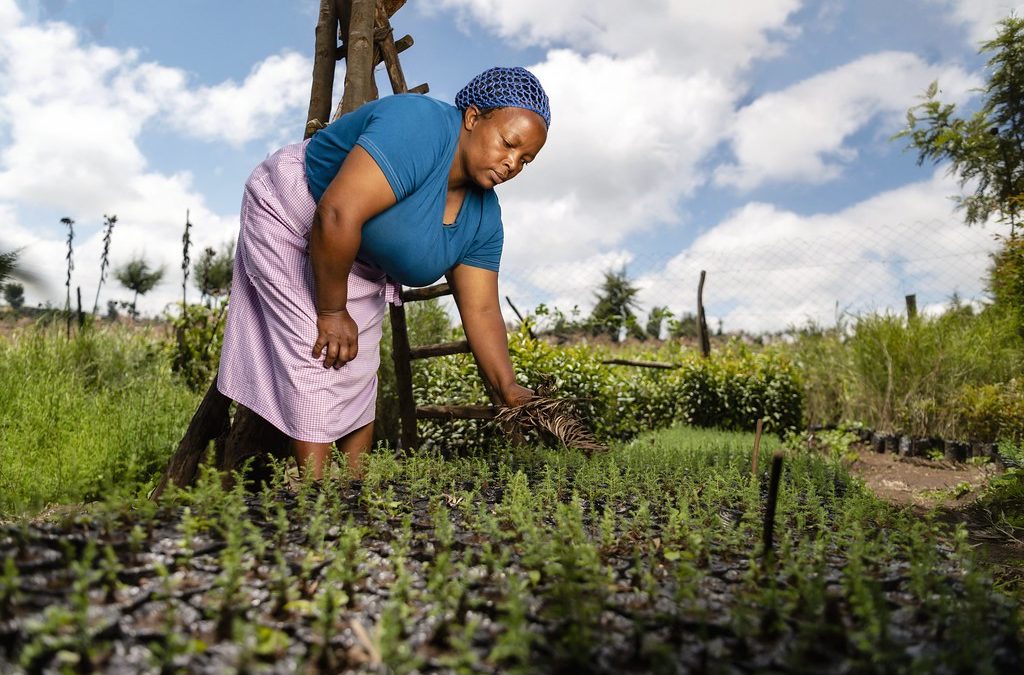The EU has scaled up its contribution to reach Sustainable Development Goal 5 in all internal and external policy areas. Gender equality and empowering women and girls are among the top priorities of DG INTPA. This is also reflected in the EU gender equality strategy 2020-2025 and the Gender Action Plan III, which sets out the EU’s political and operational roadmap towards a gender-equal world.

Increasing gender equality can be a game changer in tackling key environmental challenges, which include land degradation and biodiversity loss. Africa – a key EU partner – faces land degradation, which poses a serious threat to the continent’s sustainable development. The Sahel region is at the forefront of this challenge as desertification is expanding further south of the Sahara. This calls for urgent action to reverse land degradation and biodiversity loss, and to address climate change.
The case of Regreening Africa
Regreening Africa is an example of EU-funded intervention which aims at restoring land ecosystems while supporting gender-equitable policies and practices to empower women and girls. The project contributes to the Great Green Wall initiative and seeks to reverse land degradation across one million hectares, benefitting 500,000 households in Mali, Niger, Senegal, Ghana, Ethiopia, Kenya, Somalia, and Rwanda.
In the four years after its inception in 2017, the project reached over 600,000 hectares of land, and over 400,000 households. This initiative involves tree planting, farmer-managed natural regeneration, soil and water conservation, value chain support and policy engagement.
Enhancing women’s inclusion and agency – that is their capabilities, choices and actions as full citizens and agents of development – is essential for land restoration and also benefits the community.
Regreening Africa – Best practices:
1. Implementing a gender transformative approach
Regreening Africa has incorporated interventions that reach and engage women by providing equal opportunities for participation while also adapting tools for addressing underlying causes of gender inequality. One approach to ensure women’s social and economic empowerment is to make sure they are included in decision-making, so that they can influence and make land decisions that are reflective of their preferences. The Gender Transformative Approach. (GTA) has been used to design targeted interventions to engage men and women in discussions about unbalanced access to resources, workloads, participation in decision-making and perceptions of women’s roles and contributions. This is done in the hope of improving household well-being, and ultimately resilience, from the redistribution of assets, control, and decisions.
GTAs have been useful because they support and enrich the process of dispelling gender stereotypes. These approaches equip men and women with capacities to discuss sensitive topics, set collective visions and map desired changes that benefit them and the well-being of their households. The strength of a GTA can be attributed to simulating change scenarios, which are helpful in appraising people’s reactions and giving them the opportunity to reflect, react and adjust accordingly. This helps to avoid hostile situations where people feel alienated because of changes they have or have not made in the community.
The GTA has also provided a better appreciation of the responsibility that researchers and practitioners need to assume in order to be able to deliver firstly on gender-equality goals, and secondly, on the need to strengthen the capacity of project staff and implementing partners. This is a key precondition to successfully deploy context-specific gender tools and approaches that are tailored to the needs and conditions of different communities.
2. Stimulating the economic inclusion of women through a community savings programme
World Vision Ghana(link is external) has supported the economic empowerment of women, through Savings for Transformation (S4T), allowing them to participate meaningfully in economic and agroforestry practices. It also makes it possible for women and men to access alternative income-generating activities that reduce pressure on forests and forest products, thereby allowing trees and shrubs to regenerate.
S4T has been life-changing for 43-year-old Jafaru Azaratu, from Asomnore community in Zebilla, Bawku West District of the Upper East Region of Ghana. A trained baker, Azaratu could not put her skills to use, due to financial constraints. When she joined the S4T, she borrowed GHC 300 (50 USD) to start a baking business. She quickly repaid the money and took another loan of GHC 500 (84 USD), which she used to construct her bakery. Through the baking business, Azaratu and her husband have put all their children in school. Azaratu is now a full-time baker, supplying other retailers. From the business, she purchased three vehicles to serve as distribution vans. She has also hired nine workers, six of whom are women, thereby creating employment for women and youth.
3. Shifting local perceptions over women’s land ownership
Secure land tenure rights not only promote sustainable land management, which improves the effectiveness of efforts to combat and adapt to climate change, but are also critical for women’s social and economic empowerment. An enabling policy and legal environment boost the scaling process for both land restoration and women’s agency. Such policy has benefitted women’s groups in Malem Hodar, Secco Keur Savely and Niakhene villages in Senegal.

Regreening Africa also capitalised on the control women have over their homestead gardens; encouraging them to integrate trees in their farms – like Baobab, Moringa and Ziziphus – that have a high nutritional and economic value. Agroforestry in home gardens in Darou Nadjigui village provides year-round vegetables and tree products for consumption and sale; thereby improving household nutrition, livelihoods, women’s financial situation, and their overall status in the community.
Watch a video about how Regreening Africa supports the Chongoo Cheptengis Okilegei nursery group.
Originally published by European Union

